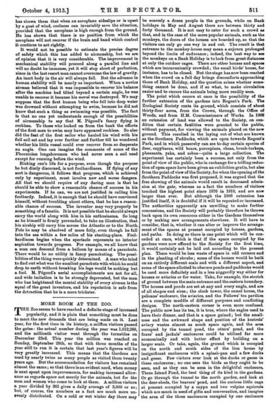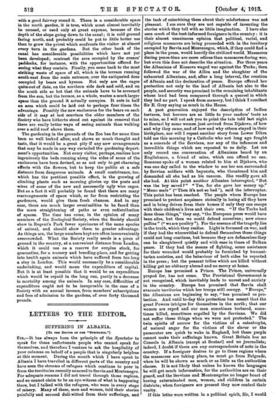MORE ROOM AT THE ZOO.
THE Zoo seems to have reached a definite stage of increased popularity, and it is plain that something must be done to meet the new demands that are being made on it. Last year, for the first time in its history, a million visitors passed the gates : the actual number during the year was 1,012,288, and the millionth visitor went through the turnstiles on December 23rd. This year the million was reached on Sunday, September 28th, so that with three months of the year still to run it is certain that last year's figures will be very greatly increased. This means that the Gardens are used by nearly twice as many people as visited them twenty years ago. But the accommodation for visitors has remained almost the same ; so that there is an evident need, when money is next spent upon improvements, for making increased allow- ance as regards space not merely for the animals, but for the men and women who come to look at them. A million visitors a year divided by 365 gives a daily average of 3,000 or so ; but, of course, the numbers as a fact are much more un- evenly distributed. On a cold or wet winter day there may be scarcely a dozen people in the grounds, while on Bank holidays in May and August there are between thirty and forty thousand. It is not easy to cater for such a crowd as that, and in the case of the more popular animals, such as the monkeys, the doors of the houses are boarded up, so that the visitors can only go one way in and out. The result is that entrance to the monkey-house may mean a sojourn prolonged beyond the limits of endurance ; indeed, the best way to see the monkeys on a Bank Holiday is to look from great distances at only the outdoor cages. There are other houses and spaces which are inconveniently crowded ; the small birds' house, for instance, has to be closed. But the stage has now been reached when the crowd on a full day brings discomforts approaching those of Bank Holiday, and the question arises whether some- thing cannot be done, and if so what, to make circulation easier and to ensure the animals being more readily seen.
The point which occurs at once is the possibility of the further extension of the gardens into Regent's Park. The Zoological Society rents its ground, which consists of about thirty-four acres, from the Crown, through the Office of Woods, and from H.M. Commissioners of Works. In 1908 an extension of land was allowed to the Society, on con- dition that certain facilities were granted to the public, without payment, for viewing the animals placed on the new ground. This resulted in the laying out of what are known as the Southern Paddocks, which are open towards Regent's Park, and in which passersby can see to-day certain species of deer, capybaras, wild boars, porcupines, rheas, brush-turkeys, pheasants, yaks, and zebus—quite a large collection. The experiment has certainly been a success, not only from the point of view of the public, who in exchange for a trifling reduc- tion of open space have been given an exhibition gratis, but also from the point of view of the Society, for when the opening of the Southern Paddocks was first proposed, it was argued that the free showing of the animals would result in decreased admis- sion at the gate, whereas as a fact the numbers of visitors touched the highest point since 1876 in 1910, and are now larger than ever. But although the 1908 extension has justified itself, it is doubtful if it will be repeated or increased. The authorities apparently are unwilling to make further concessions, and the Society will probably therefore be thrown back upon its own resources either in the Gardens themselves or by making new arrangements elsewhere. It will have to consider, that is, whether it can alter or improve the arrange- ment of the spaces at present occupied by houses, garden; and paths. In doing so there is one point which will be con- ceded at once, which is that if the space occupied by the gardens were now offered to the Society for the first time, it would certainly not be laid out according to the present plan. There would be less waste of space in odd corners and in the planting of shrubs ; some of the houses would be built on an entirely different scale and with a different aspect, and some of the space allotted to obscure ponds and paddocks would be used more definitely and in a less niggardly way either for houses or aviaries or for water. Take, for example, the stretch of ground between the main entrance and the eastern boundary. The houses and ponds are set at any and every angle, and are of all shapes and sizes ; the clock tower, the camel house, the pelicans' enclosure, the aviaries, and the Fellows' tea pavilion are a complete muddle of different purposes and conflicting designs. The north-eastern corner is even more confused. The public now has its tea, it is true, where the eagles used to have their dinner, and that is a space gained ; but the small- ness and the awkward shape and position of the kestrels' aviary wastes almost as much space again, and the area occupied by the tunnel pond, the otters' pond, and the foxes' and jackals' enclosures could be utilized far more economically and with better effect by building on a larger scale. Or take, again, the ground which is occupied on the north and south sides of the lion house by insignificant enclosures with a splash-pan and a few ducks and geese. Few visitors ever look at the ducks or geese in these enclosures ; no one sees the birds as they ought to be seen, and as they can be seen in the delightful enclosure, Three Island Pond, the best thing of its kind in the gardens. Or go through the tunnel to the north garden, and look at the deer-sheds, the beavers' pond, and the curious little cage at present occupied by a coypu and two vulpine squirrels which are much in need of gifts and conversation, and imagine the area of the three enclosures occupied by one enclosure with a good fairway round it. There is a considerable space in the north garden, it is true, which must almost inevitably be unused, or used only at great expense, because of the depth of the slope going down to the canal ; it is cold ground facing north, and probably could be put to little better use than to grow the privet which confronts the visitor at almost every turn in the gardens. But the other bank of the canal has considerable possibilities which have not yet been developed; contrast the area occupied by the cranes' paddocks, for instance, with the opportunities offered for seeing what they contain. Finally, you come back to the most striking waste of space of all, which is the terrace running south-east from the main entrance, over the antiquated dens occupied by bears and hyenas. Not only are the cages quite out of date, on the northern side dark and cold, and on the south side so hot that the animals have to be screened from the sun, but the terrace, as a whole, wastes a much larger space than the ground it actually occupies. It cute in half an area which could be laid out to perhaps four times the advantage. Possibly the new enclosures for the bears on each side of it may at last convince the older members of the Society who have hitherto stood out against its removal that there are really better ways of seeing animals than walking over a solid roof above them.
The gardening in the grounds of the Zoo has for some time been so well looked after, and shows so much thought and taste, that it would be a great pity if any new arrangements that may be made in any way curtailed the gardening depart- ment's opportunities. Not every visitor, perhaps, realizes how ingeniously the beds running along the sides of some of the enclosures have been devised, so as not only to get charming effects with the flowers, but to keep the public at a safe distance from dangerous animals. A small contrivance, too, which has the prettiest possible effect, is the growing of climbing plants such as morning glories up the posts and wires of some of the new and necessarily ugly wire cages. But as a fact it will probably be found that there are many rearrangements of space which, so far from restricting the gardeners, would give them fresh chances. And in any case, there are much larger eventualities to be faced than the mere straightening of paths or even redistribution of spaces. The time has come, in the opinion of many members of the Zoological Society, when the Society should show in Regent's Park fewer specimens of the same species of animal, and should show them to greater advantage. As things are, the large numbers kept are often inconveniently overcrowded. What the Society really needs is a piece of ground in the country, at a convenient distance from London, which it could use as a reserve for surplus stock, for quarantine, for a nursery and breeding-place, and for getting into health again animals which have suffered from too long a stay in London. This would necessarily be a considerable undertaking, and would mean the expenditure of capital. But it is at least possible that it would be an expenditure which would be repaid in the long run, partly in a decrease in mortality among the animals. In any case, difficulties of expenditure ought not to be insuperable in the case of a Society with an annual income, from members' subscriptions and fees of admission to the gardens, of over forty thousand pounds.



































































 Previous page
Previous page